- Home
- Donald Hamilton
The Silencers Page 9
The Silencers Read online
Page 9
“Who’s us, and where’s in?”
Buddy hesitated and gave me a sharp glance, but he said readily enough: “Us are noted figures of press, radio and television, selected for integrity and patriotism. It helps if you happen to be a reasonably good reporter, too, but it isn’t absolutely necessary as long as you can prove that your grandma never spoke nicely to Karl Marx. Of course, you also have to swear that you won’t print a damn thing but what they want you to.” He jerked his head towards the tourist court. “In there are also some eminent scientists thawing out their frozen tootsies, some senators and congressmen and some representatives of friendly foreign governments. And if you try to tell me you don’t know why we’re here, I’ll call you a liar.”
I grinned. “Of course it’s just a guess. I could be wrong.”
“Yeah,” he said. “Wrong enough to hire a truck and plow through three feet of snow to get here.” He paused, but I saw no necessity to put him straight about the ownership of the truck. He went on: “Well, I’m afraid you’ve had your trouble for nothing, pal, unless you want to grab a candid shot of the old man waving his arms, and that’ll probably cost you your camera and a year in jail. The security on this picnic makes the old Manhattan Project look like a national convention with full network coverage.”
“Pretty rough, eh?”
“Hell, you can’t even throw away a Kleenex you’ve blown your nose on without having some snoop pick it up to make sure it contains nothing but snot—no uncensored messages to accomplices on the outside, nothing. They’ve got a bad case of nerves about something, and this weather isn’t making them any happier. We were supposed to land in Alamogordo yesterday and drive up, but the whole damn valley was socked in, so they couldn’t put us down any closer than Roswell, and hours late at that. You can imagine—the way the snow was coming down—the fun we had driving in convoy over the mountains in the dark. If the old man wasn’t a slave driver at heart, we’d never have made it, but he’s bound he’s going to set off his big firecracker without any more delay. Naldi’s trying to tell him that even after the snow melts those desert roads are going to be too muddy to use, but five gets you ten Rennenkamp won’t listen to reason. He’s already sore at Naldi for causing one postponement.” Buddy frowned, looking past me. “Uh-oh. The little snoop just went to get the big snoop. You’d better get out of here.”
“Why?” I asked. “What do you mean?”
“I told you. We’ve got security with a capital S... Wait a minute.” Buddy lowered his voice. “I’m stuck with this junket, and, much as I hate giving a tip away... Look, if you want a story, don’t waste your time here. It’s all sewed up tight, big Washington deal, no freelancers need apply. Get over to Carlsbad, you know, the Caverns—the National Park—not the town. Check and see if maybe they’re not planning to be closed one day very soon. Nobody’s publicizing it, but I’ve got information that says they will be.”
“Meaning,” I said, “just what?”
“Use your head. They’re closing the caves, kind of casually—for repairs to the stalactites and stalagmites, I guess—so there won’t happen to be anybody underground on a certain second of a certain minute of a certain hour of a certain day. They may even clear the personnel from the buildings located directly over the caves, on some excuse or other. Does that ring a bell or doesn’t it? Remember, Carlsbad’s almost two hundred miles southeast of ground zero, in another range of mountains entirely—if I remember the geography of my home state correctly.”
“Wow!” I said. “If you’re right—”
“I had it on pretty good authority. Naldi himself advised it, I heard, and he’s been studying ground shocks since the last days of Pompeii or thereabouts, so he ought to know what he’s talking about. Looks as if somebody isn’t quite sure this gun isn’t loaded, eh? And little old Buddy’s going to be sitting in a lousy little blockhouse out in this lousy valley, looking a mountain full of hot stuff right in the eye... Just get down there, Flash. If anything does go wrong, they’ll try to cover up, they always do. I’d like to know there’s somebody out here with newspaper training getting the real story of the boo-boo... No, Matt,” he said in an entirely different voice, “I’m sorry as hell, but I can’t tell you a thing. If you want information, you’ll have to apply to the proper... Oh, hello, Peyton.”
There were footsteps behind me, and somebody grabbed my arm and swung me around. There are some beautiful responses to that opening which leave the other fellow much less healthy than he was, but this didn’t seem like the proper time to use them. I let myself be turned, and found myself facing a lean Madison Avenue figure in dark-gray flannels, a gabardine topcoat and a hat with a brim so narrow it hardly seemed worth putting on. He didn’t look funny, however, not even out here in the land of the broad-brimmed Stetson. No man with those pale fanatic’s eyes ever looks funny to me. I saw too many of them goose-stepping in fancy uniforms while I was operating on the continent during the war.
“Is this the man?” he asked.
I thought he was addressing Buddy, and it didn’t make sense, but then I saw another man standing by—a bigger, older man who looked uncomfortable in civilian clothes. He might have been ex-Army, but I doubted it. He looked ex-cop to me. He glanced from me to the truck and nodded.
“That’s the guy, Mr. Peyton,” he said. “That’s the pickup he was driving. He was coming along the street real slow with his head out the window like he was looking for something.”
“When was this?”
“Oh, say fifteen-twenty minutes ago. When I saw him come by again from a different direction, and stop, I figured I’d better let you know.”
The younger man never took his colorless eyes from me. They weren’t gray, they weren’t blue, and they certainly weren’t green or brown. They must have had some kind of pigmentation, since they weren’t white, either, but I couldn’t put a name to it. They were the eyes of a man who’d always think he was right, no matter how wrong he might be.
“Well,” he said, “who are you and what have you got to say for yourself?”
Buddy McKenna stepped forward. “Lay off, Peyton,” he said. “The boy’s just a free-lance photographer looking for a few pix. Can you blame him? We aren’t all on Uncle Sam’s payroll, you know. Some of us have to work for a living.”
It made me feel a little guilty to have him come to my defense like that, since—although he didn’t know it—I was on Uncle Sam’s payroll, too.
The man called Peyton turned slowly to face him. “Mr. McKenna,” he said, “before we started, you were informed as to the regulations that would be in effect for this group of observers and the reasons for them. You were asked not to communicate with anyone from the time you joined us in Washington for the preliminary briefing to the conclusion of the experiment when you would be free to submit your story—subject, of course, to proper clearance.”
“All right, all right,” Buddy said, “so who’s communicating? Can’t I say hello to an old friend I see on the street?”
He winked at me. We were newspapermen together, disrespectfully bamboozling the pompous forces of law, order and security, as always, for the sake of the picture and the story—and maybe, incidentally, an ancient principle known as the freedom of the press.
“You know this man?” Peyton demanded.
“Sure, I’m just telling you—”
“How long have you know him? When was the last time you were in touch with him?”
“Why, hell, it was...” Buddy thought back and seemed shocked at the passage of time. “Jeez, he was just a long, skinny, green kid with a brand new camera, it must have been a year or two before the war. My God! I didn’t think it had been that long!”
“And you haven’t seen him since or communicated with him in any way? And today you just happen to see him driving along the street... You say he’s a photographer? That’s very convenient, isn’t it, your coming across a photographer friend at just this time? You may be sure the coincidence will be investigat
ed, Mr. McKenna.”
Buddy said, “I don’t like your insinuations. I didn’t send for—”
“In that case,” Peyton said coldly, “since you haven’t heard from this man in—what is it?—fifteen or twenty years, you’re hardly in a position to vouch for him, are you? I think you’d better leave us. I’ll talk to you later.”
Buddy hesitated, shrugged and gave a mock salute. “So long, Hash. Remember the motto of the working press: lllegitimati non carborundum. That means don’t let the bastards grind you down.”
He strolled away. Peyton watched him go, and I knew that if anything could happen to Buddy in the way of clearance or censorship troubles, it would. Well, I’d got other men into worse difficulties—LeBaron for one—but I was sorry just the same. On the other hand, while he’d given me some interesting things to think about, Buddy hadn’t exactly helped me out, either.
Peyton started to turn back to me, and I braced myself for the coming inquisition, but the top-brass argument by the cars was just breaking up, and he swung his frown in that direction.
The dark-haired man, Naldi, was saying, “Doctor, I respectfully submit that I know these mountain and desert roads better than you do, having explored them quite thoroughly in all kinds of weather—”
“And I say, doctor,” Rennenkamp interrupted, “that I am in charge of this operation, and I will not stand for any further delay. If we can harness the energy of the atom and transport mankind to the stars, I find it hard to believe that we cannot solve the problem presented by a few miles of snowy, or muddy, roads.”
“Doctor—”
“There will be no further postponement,” Rennenkamp said. “That is final, doctor.”
The dark-haired man glared at him and flung away, coming towards us briefly so that I could see his face, quite swarthy, with rather small rimless glasses perched on a rather large bony nose. He snatched out a key and started to unlock the door of one of the motel units, and for a moment I caught a view of the back of his head from an angle—the same angle from which I had once viewed the head of a man with black hair through the smoky air of the Club Chihuahua while a girl in a yellow satin dress came teasingly along the edge of the stage...
Then he was gone. I suppose it was my duty to tell Peyton, who was watching the white-haired figure of Dr. Rennenkamp stride firmly across the driveway. I did consider it.
I said, “That was Henry Naldi, wasn’t it? The black-haired guy?”
Peyton wheeled to face me. “That was Doctor Alexander Naldi—” He checked himself abruptly.
I grinned. “Alexander,” I said. “Thanks. And Rennenkamp’s first name—Excuse me, Doctor Rennenkamp’s first name is Louis, I believe.” I took out my notebook and wrote. “And yours, Mr. Peyton?”
He snatched the notebook from me. It was too bad. He’d put his hand on me once, but I was willing to overlook that, reluctantly. But he wasn’t acting at all like a man who wanted help with his little problems, and his problems weren’t my problems... Having my notebook, he took me by the arm. Considering the cultivated way he was dressed, he had a very rude way of dealing with people. It was too bad.
“This way, you,” he said grimly. “I have some questions for you... Bronkovic, take a look through that vehicle.”
“Yes, sir,” the big man said. “What about the lady?”
“The lady?”
It must have been a blow to Gail; she wasn’t used to being overlooked. That he hadn’t even noticed her face at the cab window showed the dedicated nature of Mr. Peyton; he’d been too busy glowering at the rest of us. He looked now and wasn’t particularly impressed. His expression said no pretty face would ever deflect him from his duty by a fraction of a degree.
He started to speak. Then he hesitated, and looked again, and something changed in his pale eyes. He surveyed the truck briefly, as if he hadn’t really seen it before. He glanced at the California license plate. He glanced at me. After a moment, he cleared his throat and released my arm.
“On second thought,” he said, “on second thought, maybe I’ve been a little hasty.”
For him, that was like an ordinary person’s confessing to killing his mother with a stolen axe. I tried not to look surprised, but succeeded only fairly well.
“Yes,” Peyton said thoughtfully, “a little hasty. As Mr. McKenna pointed out, you fellows do have a living to make.” He handed back my notebook. “I suppose the headlines will read, scientists stranded in snow. Well, it’s legitimate news, and even if it makes us look a little foolish, I see no reason to suppress it. I’m Paul Peyton, security officer in charge. This is Dan Bronkovic, one of my assistants. I’m sorry that I am not permitted to authorize any interview or pictures at this time. You’ll have to do the best you can with what you have.”
He paused, surveyed us briefly as if committing us to memory, made a gesture towards raising his snappy little hat to Gail and stalked away. Bronkovic, looking puzzled, followed. I walked around the truck and got in and drove away, not fast, but as fast as I could without looking too much like a man with a guilty conscience.
“Well!” Gail said. “What was that? Why did he let us go?”
“I don’t know exactly,” I said, “but he had our description from somewhere, once he got around to thinking about it, that’s obvious. I guess various people in Washington have decided to cooperate after all, and the word’s gone out to lay off a tall, skinny man, a beautiful woman and a truck with California plates.”
“Oh.”
“I must say it’s a relief,” I said with a grin. “He didn’t have what you’d call a reasonable attitude, and he was a little too free with his hands. If he hadn’t already had the official word, I might have run into trouble trying to make him listen to my explanation of what I was doing with a loaded revolver and an illicit film capsule in my boot.”
I felt a little guilty saying it, now that we were back on a moderately friendly basis again, but there were some things she was better off not knowing—and after all, it wasn’t really a lie. I hadn’t said there was any film in the capsule.
15
They pulled out a little after eleven. We could see them go from the window of a tourist court near the highway junction. Security or no security, nobody could have missed the caravan of government cars heading out across the valley.
“Well,” I said, “I guess there’s no doubt about who won the argument. Okay, let’s get to work. I didn’t want to risk bumping into any of Peyton’s minions—no sense pushing our luck—but now they’re gone, let’s grab some lunch and take this town apart. We’ll do it on foot this time, street by street. If you’ve got anything in the way of boots or overshoes, you’d better put them on. It’s getting pretty damn slushy out there...”
It was a rough afternoon, and the snow didn’t help a bit. When we weren’t wading through the slush, it was being splashed on us by passing cars. At dinner time, the tally stood at no Wigwams, one Tepee, two telephone subscribers named Hogan—a hogan is a Navajo hut—and a small Eskimo igloo constructed by a bunch of Spanish-American kids with happy dark faces. They thought the snow was real great. It had closed the schools for the day.
We checked every name and every structure that could possibly be taken to represent an Indian dwelling of any kind, and finally, at dusk, we stumbled into the Cholla Bar and Grill defeated and so tired that we couldn’t even talk until we’d polished off the first round of Martinis.
“I still think,” Gail said, “that our best bet is the Tepee.”
The Tepee was a tent-shaped drive-in we’d discovered on the edge of town that apparently served ice cream and kindred products in summer.
“It’s closed up tight,” I said.
“Well, it’s just the sort of mistake a... a dying person might make. Tepee-Wigwam. Wigwam-Tepee. Janie was trying to tell me, but she just got confused...”
I said, “Gail, the joint was boarded up. The folks who run the place are in El Paso for the winter. We checked; nobody’s been around for mo
nths. It’s no damn good.” She didn’t speak, and I said, “You’re still quite sure your sister said Wigwam?”
“You keep asking me that. Of course I’m not absolutely sure. There was a lot of noise and... well, she was dying. I’ve never seen a person die before. But I know what I think I heard. I can’t help it if—”
“Okay,” I said, cutting her off. “Suppose it is Wigwam, are you quite sure she said Carrizozo?”
She set her glass down so quickly that part of her drink slopped out. “Why don’t you say what you really think?” she demanded with sudden violence. “Why don’t you say that you still think I... I’m lying, leading you on a wild-goose chase for some... some sinister purpose...!” Her voice broke. “Oh, God, I wish I’d never come on this fantastic expedition! Just look at me! I haven’t had my clothes off for two days, and I’m so t-tired and d-dirty I could cry! I wish I’d just told that nasty old b-boss of yours what he could do with his lousy blackmailing... Ouch!”
She leaned down and rubbed her shin where I had kicked her, glaring at me across the tabletop.
“Keep your voice down,” I said. “Don’t go hysterical on me, glamor girl. Finish your drink and read your menu.”
She straightened up. “One of these days,” she breathed, “one of these days somebody’s going to take a baseball bat to you, and I hope I’m there to see it!”
“Sure,” I said. “If you want to pull out, they run buses to El Paso. Either stop screaming at me and behave yourself, or beat it.”
There was a little silence, then she pushed a wisp of hair back from her face and picked up her Martini glass. She spoke in a cool voice, devoid of anger or hysteria.
“I thought if I didn’t cooperate I’d go to jail as a dangerous enemy agent.”
I laughed. “We were bluffing, glamor girl. Haven’t you caught on yet? For a poker-playing Texican ranch girl you bluff easier than any human being I ever met. I’d love to play you for money some time. Go ahead and go, wherever you want to. Nothing will happen, nobody will whisper a word against you.”

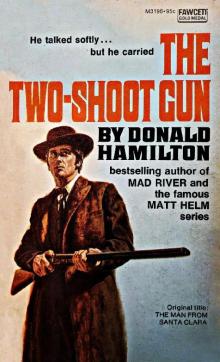 The Two-Shoot Gun
The Two-Shoot Gun Mad River
Mad River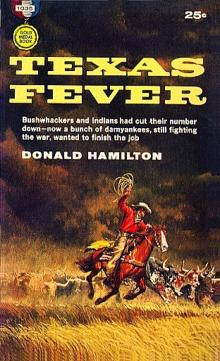 Texas Fever
Texas Fever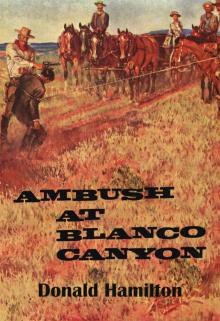 Ambush at Blanco Canyon
Ambush at Blanco Canyon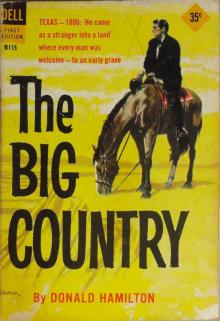 The Big Country
The Big Country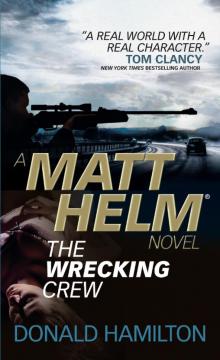 The Wrecking Crew
The Wrecking Crew The Devastators mh-9
The Devastators mh-9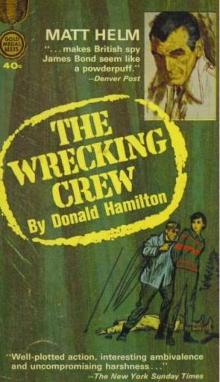 The Wrecking Crew mh-2
The Wrecking Crew mh-2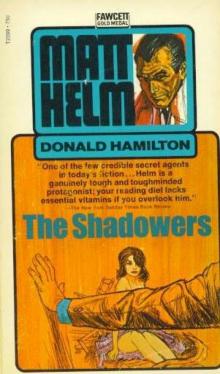 The Shadowers mh-7
The Shadowers mh-7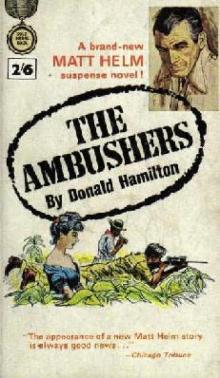 The Ambushers mh-6
The Ambushers mh-6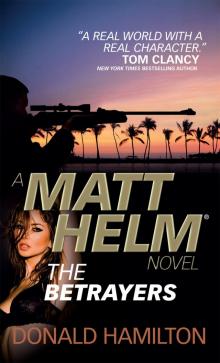 The Betrayers
The Betrayers The Terrorizers
The Terrorizers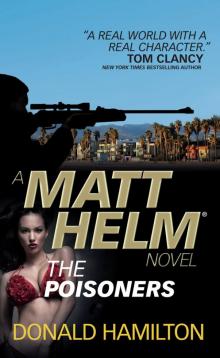 The Poisoners
The Poisoners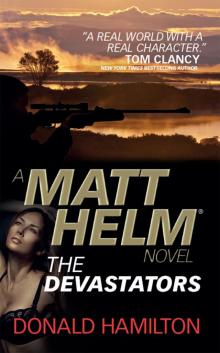 The Devastators
The Devastators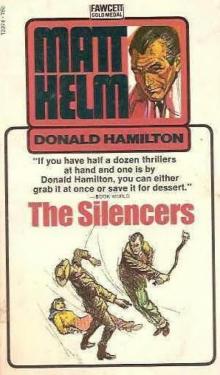 The Silencers mh-5
The Silencers mh-5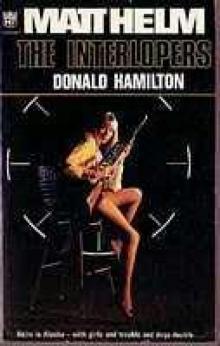 The Interlopers mh-12
The Interlopers mh-12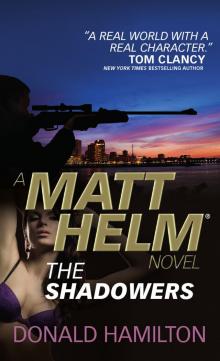 The Shadowers
The Shadowers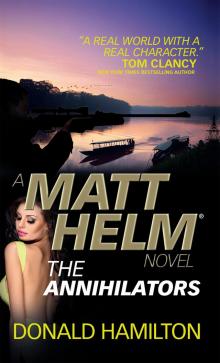 The Annihilators
The Annihilators The Vanishers
The Vanishers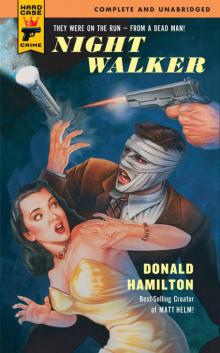 Night Walker
Night Walker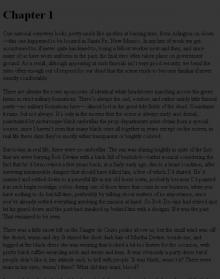 The Revengers
The Revengers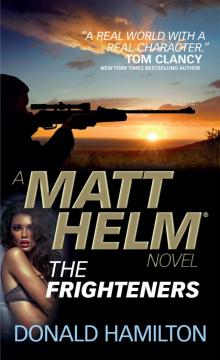 The Frighteners
The Frighteners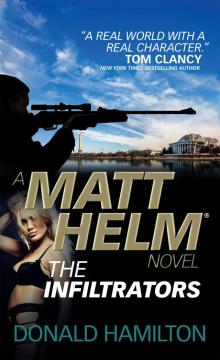 The Infiltrators
The Infiltrators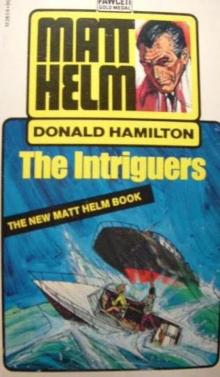 The Intriguers mh-14
The Intriguers mh-14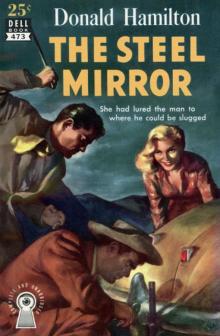 The Steel Mirror
The Steel Mirror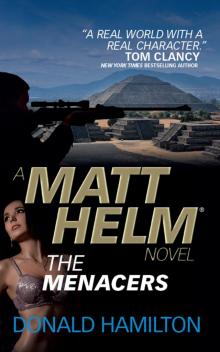 The Menacers
The Menacers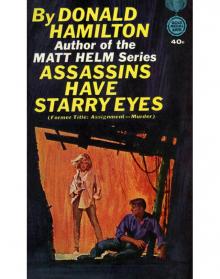 Assassins Have Starry Eyes
Assassins Have Starry Eyes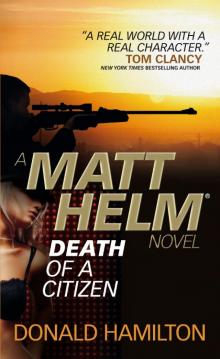 Death of a Citizen
Death of a Citizen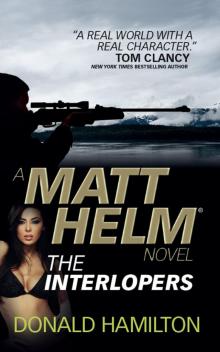 Matt Helm--The Interlopers
Matt Helm--The Interlopers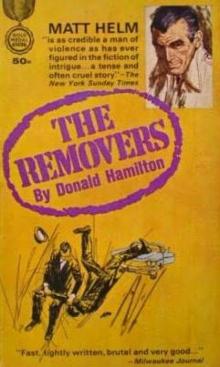 The Removers mh-3
The Removers mh-3 The Demolishers
The Demolishers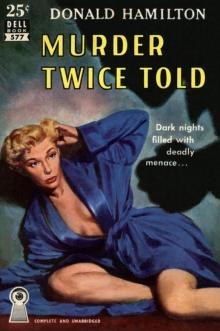 Murder Twice Told
Murder Twice Told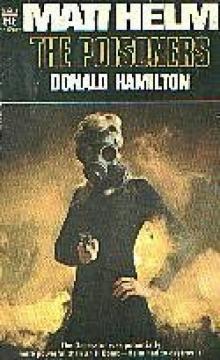 The Poisoners mh-13
The Poisoners mh-13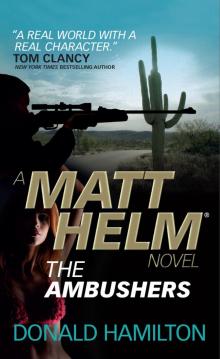 The Ambushers
The Ambushers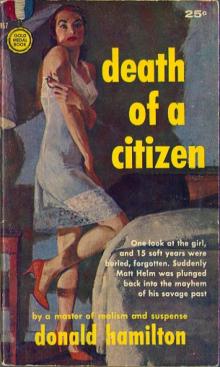 Death of a Citizen mh-1
Death of a Citizen mh-1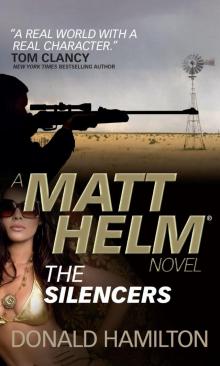 The Silencers
The Silencers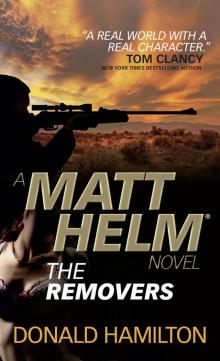 The Removers
The Removers The Intimidators
The Intimidators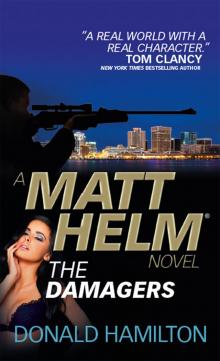 The Damagers
The Damagers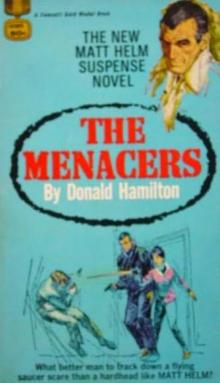 The Menacers mh-11
The Menacers mh-11 The Retaliators
The Retaliators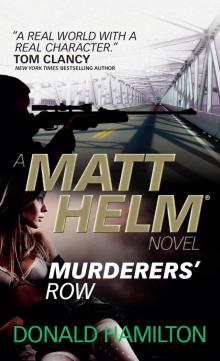 Murderers' Row
Murderers' Row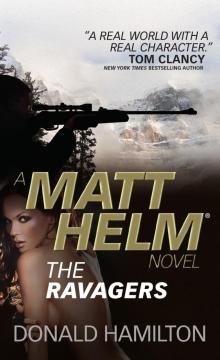 The Ravagers
The Ravagers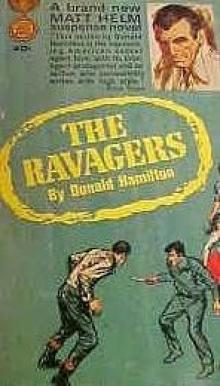 The Ravagers mh-8
The Ravagers mh-8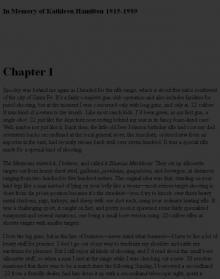 The Threateners
The Threateners The Betrayers mh-10
The Betrayers mh-10